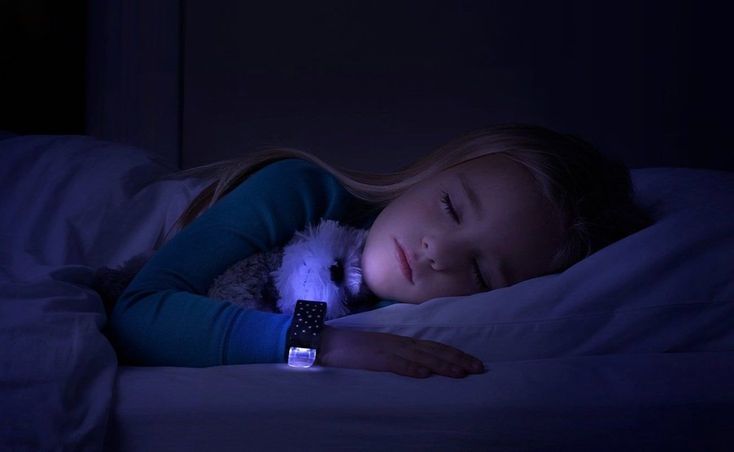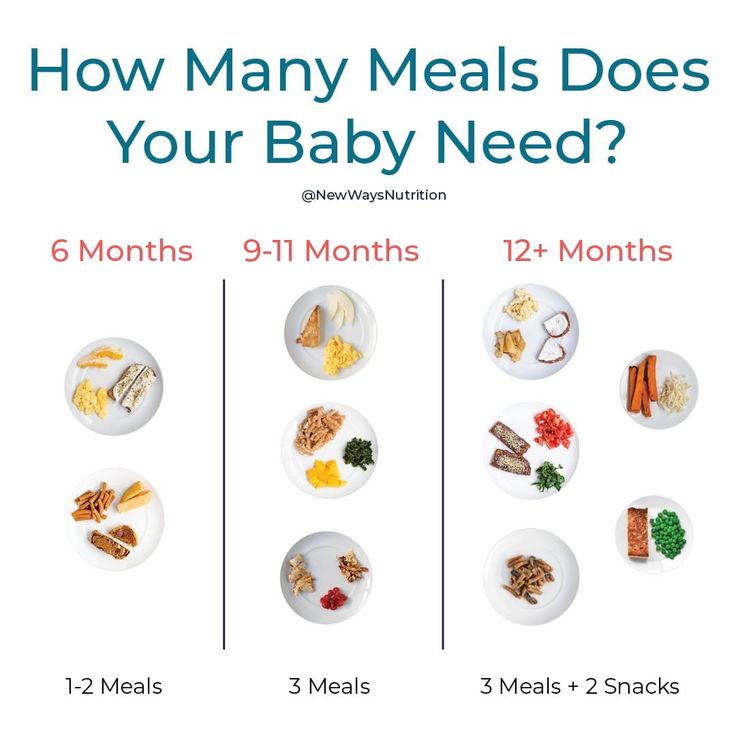Baby won t sleep after night feed
Your Baby Won't Go Back to Sleep After Night Feeding? Try These Solutions...!
At last, baby is asleep and you can finally get yourself some zzz’s.
Now the pillow is softer than ever, and the bed is suddenly sooo relaxing, and a bit of sleep is very much appreciated.
You’ve barely had the chance to doze off and next thing you know, you hear that soft to shrieking cry of hunger.
You quickly get up in the wee hours, give breastmilk or bottlefeed, and plan to sleep again… but baby won’t go back to sleep after night feeding!
You know it’s going to be another long zombified night.
Those who have a mellow baby who delightfully breastfeeds by day and predictably sleeps 4-6 hour stretches once it gets dark may be lucky.
A number of parents, however, are blessed with a high-need newborn not settling after night feeds.
Baby is cared for throughout the night, yet still requires lots of nourishment and comforting when the sun’s up.
Eventually, these parents eventually find themselves screaming ‘HELP! My baby won’t settle after night feed!’
Is your baby giving you the run for your money?
During this phase when you’re still recovering from childbirth, lack of sleep can make you feel exhausted, bleary and helpless. A few months of clocking up only 1-2 hours of sleep a night, it becomes worse.
Trust me, I know. The cry for ‘HELP!’ progresses to my baby. Some dads who are involved as far as bottle feeding or burping even said they thought they’re going to die!
The great, strong mom that YOU are, you will surely survive.
Nobody said it was easy, but nighttime feeding cycles can definitely become more manageable. In fact, it can be made enjoyable with these tips and tricks below.
Tips for Babies Who Won’t Go Back to Sleep After Night Feeding
Be Wary of Sleep Disruption
Some people wake up their sleeping child when feeding time is due. Not letting your baby develop his or her own sleep patterns will only lead to more problems.
Truth is, the more your baby sleeps, the more he will sleep. You can do the math when you get more for yourself.
Decide Where Baby Sleeps
Learning how getting baby back to sleep at night also entails openness to various sleeping arrangements.
Most infants love to snuggle with mommy, perhaps beside daddy, while some sleep better in their cot. Find the right solo or co-sleep combo that promotes a faster transition and longer sleep.
Tank Up with Frequent Day Feedings
Babies get busier as they grow, and actually, forget to eat! Instances often occur at 6 months of age.
They instead wake up and make up for missed feedings, and it could be at different times every single night.
Mom then can be the one to remind baby to nurse at different intervals during the day, such that baby won’t need to nurse as much as night.
Create The Ideal Room Environment
The brain becomes more alert when exposed to bright lights, thus making it difficult to go back to sleep.
Nighttime feeding is best done in a room with dim lights, minimal noise, and a comfortable temperature. Well, this should be the exact setup of your baby’s sleep space is the first place.
You can also read this article about baby light show projectors, because many parents share your experience and many of them are happy with the light show projector in the baby room… read this review here!
Pick the Right Time For A Change
When baby won’t go back to sleep after night feeding, avoid changing diapers at all costs! Do it right before bedtime and use one with extra absorbency feature and less risks of leaking.
Whenever necessary, change before a feeding but it’s generally best to leave the diaper on (unless it is soiled) until the next feeding.
Keep Calm and Burp
Once done feeding at night, lift baby up and do the non-stimulating burping technique. Firm and soft back strokes should be enough to get your baby to burp.
After 5 minutes and it doesn’t come up, no worries. It’s alright to put him or her back in the crib to get much needed sleep.
In the video below, Gladys Ellett shares some good burping techniques
Maintaining Contact
After your baby has fed long enough and the short burp time is up, wrap him or her in a blanket or swaddle snugly to stay warm.
Now put your child down. If you still see baby wide awake after night feeding, try patting or putting your hand close to your child.
Instead of lifting which tends to stimulate, even make baby cry hysterically when laid down awake, your loving touch will offer assurance until he dozes off.
Make Do Without A Sleep Prop
An important factor of why baby wakes up at night and won’t go back to sleep is sleep associations.
The prop, whether an object or person or action such as rocking or swinging or nursing, is what baby needs to fall asleep.
Most of us would have our baby close to our heart in a sling as we gently pace the floor and rock him gently to sleep.
Naturally, baby would expect the same prop in order to get back to sleep after feeding.
The solution is to support them with various sleep associations to prevent attachment to one, then ultimately letting go which will give you and your baby a whole lot more of normal sleep.
Laying Out The Master Plan
A happy mother and a well-fed, nurtured baby is all that matters.
Sleep deprivation won’t contribute to having a better perspective and understanding of why baby won’t go back to sleep after night feeding.
In the meantime, jump back into bed soon as baby falls asleep, with no time to waste!
The key is to catch up and execute a plan.
It doesn’t matter if your bundle of joy is merely an infant, has grown into a 5-month baby who refuses to sleep afterward after every session, or one who still wakes up at night at 18 months old.
It’s never too late to foster better sleeping habits by implementing some of the aforementioned strategies.
You’ll be delighted to see your baby become more engaging, patient, tolerant, less fussy and cranky after a quality nap.
9 Amazing Baby Sleep Tips for Night Waking
I hope you find these baby sleep tips for night waking helpful! When my son was first born, I had the whole night waking thing all wrong. There I was in the middle of the night with all the lights on, eating some crunchy snack, and watching horrible late night reality TV in the midst of feeding my baby.
post contains affiliate links
After all that, I would change his diaper and try putting him back to bed. For the life of me, I struggled to understand why he wouldn’t go back to sleep. Didn’t take me long to learn that I was doing the exact opposite of these baby sleep tips for night waking.
Didn’t take me long to learn that I was doing the exact opposite of these baby sleep tips for night waking.
If you are looking for some quick and easy ways to help your baby settle to sleep easier after a night feed, try out these tips!
1. Keep it all business.
Keep your night time routine to the basics only. Night time is no time for a party. Getting a brief nighttime routine down works wonders. Ideally, we are talkin’ diaper change, feeding, burb, back to crib.
2. Keep all the lights off.
As a night shift nurse, I was accustomed to working in the dark to avoid waking patients. So as a mom, you think this would’ve clicked before someone had to tell me this tip. Use only a night light go through your nighttime baby sleep routine.
If you can use a red night light like this Gummy Bear one, even better! Red light doesn’t emit rays that tell your brain to wake up vs. a blue or white night light.
3. Change the diaper before the feeding.
I’m a huge advocate for laying a baby down awake but drowsy to help him or her learn to fall asleep independently; however, I never worry about this during night wakings. I always nurse / bottle feed my babies back to sleep in the middle of the night.
I always nurse / bottle feed my babies back to sleep in the middle of the night.
As soon as you go to your baby, change the diaper…sometimes I even skip it altogether!
If your baby is a newborn sometimes they will poop after a night feeding. In this case, of course, you need to change the diaper after the feeding, but usually after their digestive system settles down after the first month or two, you will be able switch the diaper change before the feeding or simple change the diaper ever other night feeding.
4. Avoid eye contact.
I’m serious 🙂 Avoid all eye contact, talking, singing, excessive motion, and anything else you can think of. Basically, avoid as much stimulation as possible with your baby during the night. Again, keep it all business.
5. Hands on chest.
After the feeding and burp, lay your baby down in the crib. If your baby fell asleep during the feeding, that’s great. If your baby is still awake or sleeping lightly, hold your hand on your baby’s chest for a few minutes.
Gentle pressure can offer comfort and reassurance for your baby to settle down a bit. Remember, it can take up to 20 minutes to reach deep sleep. So don’t be afraid to wait a few minutes until you sense your baby is settled. I’m not patient enough to wait 20 minutes, but I would say 5 minutes could do the trick.
6. Early bedtime.
I was totally surprised by how much babies sleep when they are little. I had it totally wrong trying to keep my son awake in order to wear him out.
An overtired baby sleeps less, not more, and an early bedtime can help a baby sleep better during the night.
Don’t hesitate to try a bedtime between 6:30 pm and 7:30 pm to improve a baby’s overall sleepiness throughout the night. For more on finding a sleep schedule that works, check out For the Love of Sleep eBook.
You can also use these baby bedtime routine cards to help your baby settle in the evenings…
7. Use a diaper one size too big.
This is one trick I use from infancy through the toddler years.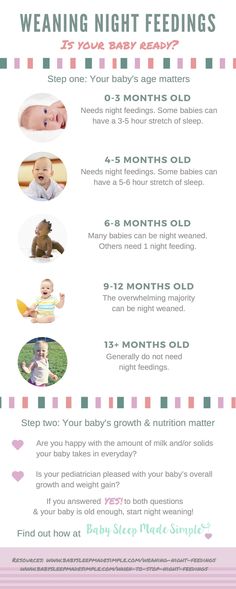 Whatever size diaper your child wears, use the next size up during the night. You’ll sleep better knowing your baby isn’t sleeping in a wet mess and so will your baby.
Whatever size diaper your child wears, use the next size up during the night. You’ll sleep better knowing your baby isn’t sleeping in a wet mess and so will your baby.
8. Start shushing.
Don’t be afraid to shush the baby. My husband is an expert at shushing. He always shushed our babies to sleep. White noise is very calming for babies, especially after hearing it for 9 months in the womb.
Shushing seems overly simple, and I would be totally annoyed if someone did that to me, but babies are different. They like it.
If you get tired of shushing {waives hand wildly} then you’ll love this baby sleep machine.
9. Follow your instincts.
Always do what you are comfortable with when it comes to your child and a sleep plan. If you end up doing something that you feel uncomfortable with, it will likely lead to inconsistency and guilty feelings. Ultimately, neither of those things will lead to better sleep in the long run.
Print your free baby sleep checklist!
This post comes with a free printable baby sleep checklist to help you support longer stretches of sleep for your baby! Plus, when you grab this printable, you’ll get instant access to my free 3-day baby sleep eCourse.
Download Your Free Printable
- Download the checklist. You’ll get the printable straight to your inbox, plus get my Free 3-Day Baby Sleep eCourse!
- Print. Any paper will do the trick, but card stock would be ideal.
- Place it on your refrigerator. Use it as a quick reference and don’t forget a thing!
Want more on baby sleep?
- My Top 10 Newborn Baby Sleep Tips To Help You Get More Sleep
- The Newborn Routine That Will Help Your Baby Fall Asleep Faster
- Top 7 Challenges + Solutions for Parenting a Newborn and Toddler
- 8 Infant Sleep Facts Every Parent Should Know
Resources for baby sleep:
- Baby Sleep Routine Printable Bundle + For the Love of Sleep eBook
I've created a free email series just for you! If you are struggling with finding a routine, rhythm or schedule, this email series will help you find one that will work for YOUR family. Yes, really. I've seen my sample routines work time and time again for parents. I know it can work for you too.
Yes, really. I've seen my sample routines work time and time again for parents. I know it can work for you too.
This free email series will help you:
- Free sample routines for your child
- Best morning routine tips and tricks your kids will actually follow
- All-time favorite parenting hacks for getting more cooperation at bedtime
- Step-by-step guide for using a printable daily schedule with kids
Click here to sign up!
Are you new to this community? Start here, friend.
Why a newborn does not sleep after feeding
It would seem that the life of a baby is very simple and is subject to the cycles of food and sleep - "food-sleep-food-sleep". As a rule, babies sleep after feeding - this is facilitated by melatonin contained in breast milk and sucking movements that help the baby relax. But sometimes it happens that after the mother has fed the baby, he does not fall asleep.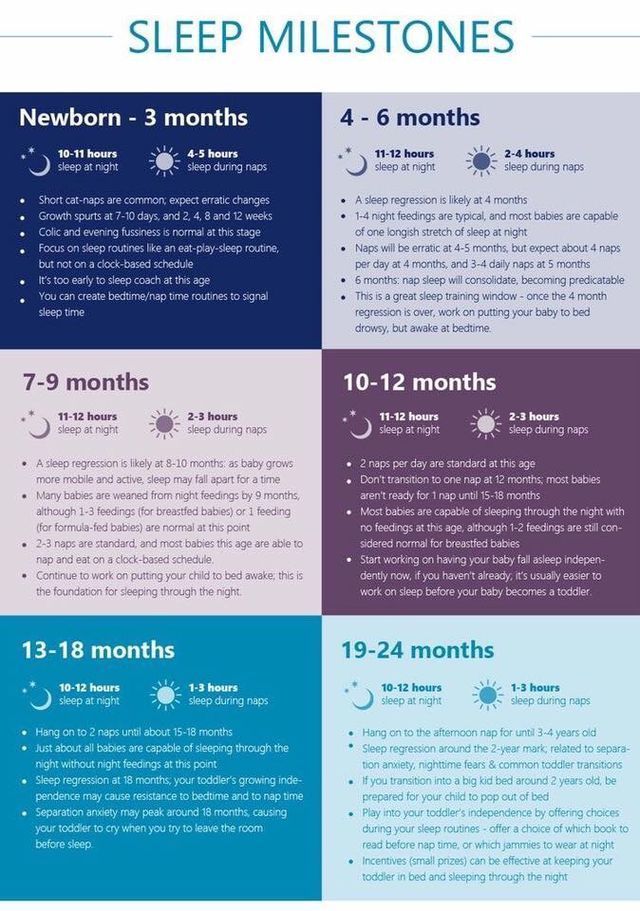
Why does the baby not sleep after feeding? Misunderstanding of the reasons can alarm the mother, upset and even cause negative emotions.
The emotional reaction of the mother is explained by the fact that her idea of the picture of sleep and life in general of the newborn may differ from the real one. At such moments, a young mother may feel incompetent, be afraid for the child, think about whether everything is in order with him.
Mother's anxiety, in turn, is not only transmitted to the child due to the very close psycho-physiological connection of the mother with the newborn, but also affects breastfeeding.
A stressed mother transmits cortisol to the baby, which makes it difficult for him to fall asleep even after feeding. In addition, stress affects the work of oxytocin, the hormone responsible for the release of milk.
As a result, the mother, who is worried that the baby is not sleeping, not only does not help him fall asleep, but also involuntarily prevents him from calming down. What to do?
What to do?
First of all, it is important for a mother to calm down herself. To do this, it is very important to take care of yourself - pour yourself a cup of your favorite hot tea, for example, take a warm shower, think about something very pleasant, look at the baby, walk around with him, looking at him. These methods also contribute to the stimulation of the production of oxytocin.
NEWBORN DOES NOT SLEEP AFTER FEEDING - HOW TO FIND THE REASON?
Keep a feeding calendar. So it will be easier to navigate the cycles of sleep and wakefulness of the baby and understand the reasons for such failures. For example, the baby woke up 10-15 minutes ago, his mother fed him, and he did not fall asleep. In this case, his wakefulness is justified - after all, the baby is simply not ready to sleep yet. Such a calendar can help you understand why the baby does not want to sleep after feeding.
The reasons may be the following:
- The baby has just woken up and just wasn't awake enough and not ready for bed
- The child is overexcited.
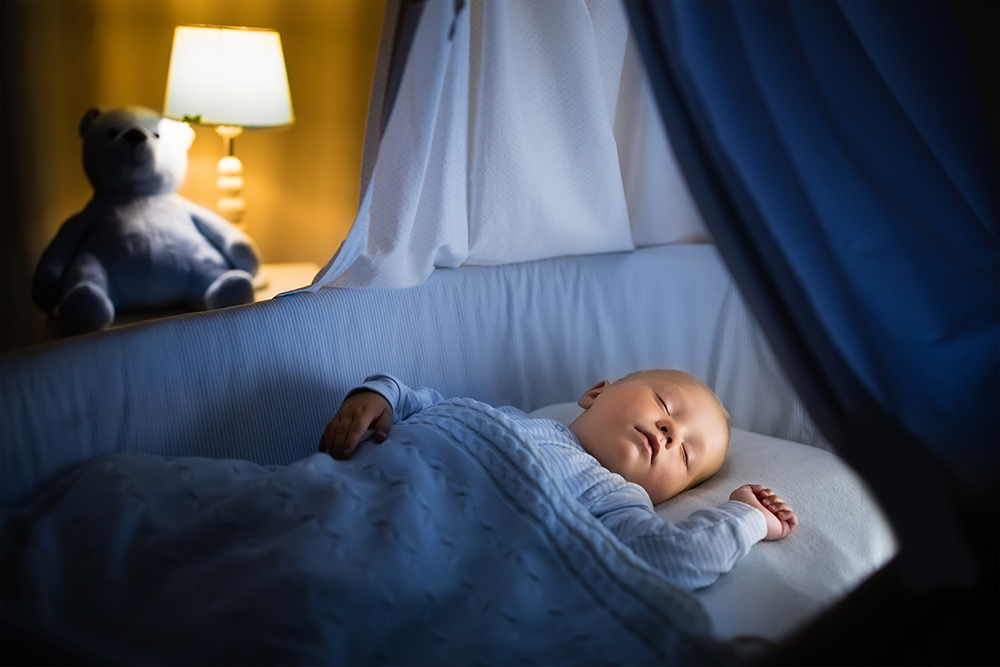 This happens in cases where the baby's wake time has significantly exceeded the allowable norm for his age, for example, a child who usually kept awake for 30 minutes was left without sleep for an hour. In this case, he can be very overtired and do not fall asleep against the background of overexcitation of the nervous system.
This happens in cases where the baby's wake time has significantly exceeded the allowable norm for his age, for example, a child who usually kept awake for 30 minutes was left without sleep for an hour. In this case, he can be very overtired and do not fall asleep against the background of overexcitation of the nervous system. - The baby may have a stomach ache. This is especially true for formula-fed children when getting used to the mixture, as well as for babies with lactose deficiency. Soreness can also interfere with your baby's sleep.
- Clogged nose, disease can greatly complicate the process of falling asleep.
- The baby is hungry. If the child has not received the volume of milk or formula he needs, he may continue to feel hungry and not fall asleep because of this.
- Unmet need for suckling. The need for sucking in the first months of a child's life is very high. In the first month, sticking before falling asleep is not yet considered a negative habit, moreover, the baby needs to make sucking movements to relax.
 If the mother took the breast early and did not offer an alternative (such as a pacifier), it may be more difficult for the newborn to fall asleep.
If the mother took the breast early and did not offer an alternative (such as a pacifier), it may be more difficult for the newborn to fall asleep. - Uncomfortable sleep conditions. The baby's room may be too hot, stuffy, in addition, he may have clothes for sleep that are inappropriate for the season or a dirty diaper. All this affects the ability to sleep peacefully.
- The need for mother's affection and warmth
VIDEO LESSON
Baby sleep from 0 to 3 months
More
HOW TO HELP A NEWBORN TO SLEEP AFTER FEEDING?
- Keeping a diary of observations of the baby with a note of the time when he sleeps and eats
- Creation of favorable conditions for sleep - a safe place to sleep, darkness, silence, comfortable temperature (20-22 degrees) in the room, sufficient humidity in the room (40-60%), comfortable clothing for the season
- Help your baby meet the need to suckle. In the first month, it is still not recommended to offer a pacifier to babies who are breastfed, since lactation is established in the first two to three months. A bottle-fed baby needs a pacifier to satisfy the need to suckle.
In the first month, it is still not recommended to offer a pacifier to babies who are breastfed, since lactation is established in the first two to three months. A bottle-fed baby needs a pacifier to satisfy the need to suckle.
- Helping the baby to relieve tummy pain (colic) - let the baby "burp" the air after eating, vilify in his arms, apply a warm heating pad to the tummy. It is also important to clean the baby's nose with the help of special devices
- Try not to overexcite the baby, do not visit noisy places in the first month of life, when his wakefulness is still quite short.
- Feed your baby on demand. While lactation is established, it is important that the baby and mother adapt to each other in terms of milk production as well. Therefore, it is very important not to wean the baby prematurely, especially since hindmilk is saturated with fats that a growing baby needs.
You can determine the degree of his readiness to sleep by the following signs:
- The baby begins to yawn
- The baby rubs his eyes
- The baby is looking for his mother, poking her nose, looking for a breast or a bottle.
If you miss this time, signs of fatigue can develop into signs of overwork:
- The baby becomes more capricious
- The baby cries
- Can arch
- Can latch on and then push off
Overfatigue threatens with complicated falling asleep against the background of overexcitation of the nervous system. To help your baby calm down and fall asleep, moms can use a range of sleep aids.
- "White noise" - monotonous sounds on the same wavelength, which work as the right association for sleep, help to relax. If you don't have a white noise machine, just go into a dark bathroom and turn on the faucet. The darkness and the monotonous sound of running water will help the child relax and fall asleep.
- Motion sickness - in the womb, the baby is used to constant motion sickness, so motion sickness works to relax and fall asleep.
Do not abuse motion sickness, do not use too intense motion sickness (for example, on a fitball or special swings) and, moreover, never shake the child, it can be dangerous! Just walk around the room with the baby in your arms, softly hiss or sing a lullaby.
![]()
- Darkness. Babies in the first 3 months of life are not sensitive to the level of illumination in the room during sleep. But nevertheless, they are curious, every day they observe and notice more and more. Many items can attract the attention of babies in the first months of life, frighten and distract from sleep. The simplest method of "turning off" the visual analyzer is to organize complete darkness in the bedroom for daytime and nighttime sleep.
- Closeness to mother , mother's hands, mother's warmth will help the baby feel safe and fall asleep.
- Soft Swaddling mimics uterine conditions well and helps to dampen the Moro reflex. If swaddling is organized safely, with the swaddling system available in our store, you can be sure that the baby will not overheat or the blood circulation will not be disturbed.
These conditions will remind the newborn of uterine conditions (dark, warm, cramped, and motion sickness), which will have a relaxing effect on the baby and help him fall asleep.
Sometimes it happens that young parents tend to overly scrupulously follow the norms given in encyclopedias on child care, on the Internet, on forums about motherhood. And, of course, these rules may vary. When parents do not have some unified theoretical base on which to rely, they can seek help from their parents - the older generation or friends, acquaintances, also parents. But here, too, the information can vary quite strongly - the older generation, for example, may advocate fairly tight swaddling and feeding the baby strictly by the hour, while modern approaches to caring for a newborn promote free swaddling and breastfeeding on demand.
Thus, despite the abundance of information, young parents are completely confused and do not understand how to feed their child and what to focus on in order to understand if everything is in order with him, from which he does not fall asleep after the mother has fed his.
Parent Alert:
- Trust trusted sources.
 Watching weight norms, for example, it is worth trusting sources that have a large research base and grounds for certain indicators. For example, WHO is the World Health Organization.
Watching weight norms, for example, it is worth trusting sources that have a large research base and grounds for certain indicators. For example, WHO is the World Health Organization. - Remember that people on the forums, your acquaintances, friends, your parents are people who have other children. What works for them may not necessarily work for your baby.
- Watch your baby and keep a diary of observations. For example: woke up - 9:30, application - 9:45. So it will be easier for you to navigate if the baby bursts into tears at 10:00 - in this case, he is most likely not hungry yet, but is either already ready to sleep, or he, for example, has a wet diaper or some other discomfort.
- Find ways to relax yourself. The anxious brain is prone to making rash decisions, so rested, full of energy parents will be able to find the best solution in any situation with their child.
The most important thing that parents need to do in order not to worry about the fact that their baby does not sleep after being fed is trust in trusted sources of information, their own calmness, trust in their own parental wisdom and, of course, love and attention to your baby.
Food and Sleep Melatonin Cortisol Signs of Fatigue
Signs of Overwork Wake Time Newborn Sleep
What to do if the baby does not sleep at night? Top consultant recommendations
07/14/2020
16
Most parents look forward to when they can put the baby to sleep at night and he will sleep until the morning without waking up. Pediatricians and sleep consultants say that this is possible as early as 8-12 months. But why, even after a year, a child often still wakes up in the middle of the night and cannot fall asleep?
Let's see why this happens and what can be done at every age!
Article content:
- How many hours of sleep does a child need at night at each age
- 0-3 months
- 3-6 months
- 6-12 months
- 1-2 years
- 2-4 years
- What threatens frequent night awakenings
- Why is it important to improve night sleep
- Causes of poor sleep
- Why the newborn does not sleep
- Why the baby does not sleep 3-6 months
- 6-12 months
- 1-2 years
- 2-4 years
- Frequent crying at night
- 0-3 months
- 4 months-2 years
- How to get a good night's sleep
- What to do if the child does not sleep at any age
- 0-3 months
- 3-6 months
- 6-12 months
- 1-2 years
- 2-4 years
- How to make laying easier
- Common mistakes of parents
- When to ask for help
- Tips for getting enough sleep for mom
Sleep periods at night in a child up to four years: normal mode
0-3 months
Infants from 0 to 3 months sleep 30-50 minutes at night, going through the stage of light and deep sleep. At this age, superficial sleep prevails over deep sleep. The baby wakes up after the end of one sleep cycle and often needs help to fall back asleep.
At this age, superficial sleep prevails over deep sleep. The baby wakes up after the end of one sleep cycle and often needs help to fall back asleep.
3-6 months
By 3 months, the beginnings of a pattern of sleep and wakefulness appear. Children sleep up to 3-4 hours in a row at night. This reduces the number of awakenings.
6-12 months
By 6 months, the baby is already sleeping the longest stretches of sleep without waking up at night. Bedding for the night falls on the time from 18:00 to 20:00. It takes less than 30 minutes for a baby to fall asleep. Provided that there are no problems with sleep and the child is not overtired. At night, the child can sleep up to 6 hours. Sometimes more.
Almost two-thirds of children wake up only once at night to feed. But there are also babies who still wake up about 3-4 times.
1-2 years
After a year, children can already sleep peacefully all night and do not need additional feedings if the diet is adjusted and there is no food-sleep association.
2-4 years
At this age, night sleep is already stable.
In the first hours after bedtime, children sleep in a deep sleep phase. Therefore, it is difficult to wake them up. In the second half of the night, babies sleep more superficially and shallow sleep. At this time, the child is easier to wake up, night awakenings occur more often during this period.
But if the baby has problems with sleep, then even in the first half of the night he may wake up often.
The sleep cycle lengthens as the child grows. By the age of 3, it reaches 60 minutes. By the age of 5, the sleep cycle in children is the same as in adults - 90 minutes.
Frequent nighttime awakenings - is this normal?
As can be seen from the description of sleep patterns at night, frequent awakenings may be normal in the first year of life. Therefore, here it is worth talking about the number and causes of awakenings and looking at the age of the child in order to understand whether it is necessary to wait out or whether it is worth working on sleep. If the baby wakes up too often for his age, sleep is fragmented, its quality worsens, the deep sleep phase is reduced.
If the baby wakes up too often for his age, sleep is fragmented, its quality worsens, the deep sleep phase is reduced.
Why is this important? Superficial sleep is responsible for the development of the brain. Deep - for physical recovery, restoration of tissues, muscles and the nervous system.
If a child sleeps short dreams and does not sleep at night, this affects his health and development:
- his mood worsens;
- activity decreases during wakefulness;
- there is a tremor of the limbs;
- muscles weaken;
- slows growth;
- there are problems with nutrition.
How much sleep should a child have at night?
Check the Sleep & Wake Chart to see if your baby is getting enough sleep.
Benefits of a night's sleep for a child
Along with nutrition, sleep plays an important role in a child's development.
During sleep, a number of processes occur in the body
- The child's brain matures and information is consolidated.
 Several studies have shown that children who sleep well and longer at night are better at learning and remembering information.
Several studies have shown that children who sleep well and longer at night are better at learning and remembering information. - Toddlers who sleep longer at night are less moody during the day, easier to negotiate with, and better able to adapt to changing events while awake. Such children more easily survive separation from their mother and are more willing to stay with a nanny or grandmother at home without her.
- Lack of sleep negatively affects growth hormone. Since this hormone is produced during rest, a child who sleeps poorly grows more slowly. Also, lack of sleep affects the weight of the child if there is a malfunction of the hormone leptin, which is responsible for the feeling of satiety. The baby will eat, even after saturation.
- When children lack sleep, coordination is disturbed, which leads to numerous injuries - the child falls more often, stumbles on level ground.
Why does the child sleep badly at night?
Children's sleep at night is affected by 3 main factors: physical, physiological-emotional and sleep habits.

Why a newborn does not sleep
- Until 2-3 months old, many newborns can sleep in any conditions. But there are more sensitive children who react sharply to the atmosphere around. In this case, the child's sleep can be affected by temperature, humidity, extraneous sounds around and lighting during falling asleep and sleeping.
- Overwork is the most common reason why a newborn does not sleep well. Up to 3 months, the baby is able to stay awake for no more than 45-75 minutes. The younger the baby, the less he spends time actively. Now even an extra 5 minutes can lead to excessive fatigue, which will complicate bedding and make sleep more sensitive.
- Strong overexcitation. Babies are born with an immature nervous system and they need time to adapt to the new world. Therefore, a newborn is easily overexcited with excessive noise, long hours of being awake, and new people around. It is difficult for the baby to process all the new information and he needs quiet time to calm down and relax.
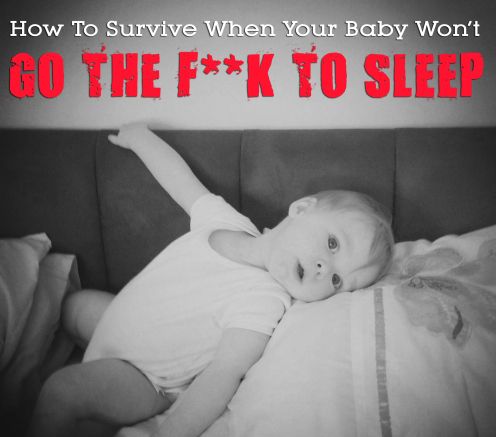
- Confusion of day and night. During pregnancy, the rhythms of the baby's sleep are closely related to the movements of the mother. When she is awake and moving, her movements lull the baby to sleep. And when she goes to bed, the baby often wakes up and is ready to play. Babies also rely on maternal hormones, especially melatonin, to help them sleep. After birth, the baby has to adapt and rely on its own internal clock, which "tells" him when to sleep and when to be awake. But the circadian rhythms of the newborn are not yet formed. Therefore, the baby can sleep more during the day than at night.
- Health problems: colic, allergies, dermatitis, colds.
Why the baby does not sleep (3-6 months)
- Sleep regression in 4 months. This is the most significant regression. The child develops circadian rhythms and begins to sleep according to the adult scenario. During regression, the baby often wakes up at night and cannot fall asleep again.
Sleep regression can begin at 3. 5 months or, conversely, a little later than 4 months. It lasts from two to four weeks.
5 months or, conversely, a little later than 4 months. It lasts from two to four weeks. - Nutrition. Does hunger cause frequent nighttime rises?
By 4 months, the baby may form a habit of eating and sleeping, if before that the mother gave a breast or a bottle every time so that he fell asleep, and fed until he fell asleep completely.
And if you form a habit in a child to eat often at night, it really wakes him up to eat. However, this does not mean that the baby is hungry at night. He doesn't know how to sleep differently. - Inappropriate mode that causes fatigue accumulation. For example, with too short daytime naps, not enough daytime naps, staying awake for too long, and leaving late at night. With chronic overindulgence, the level of the stress hormone cortisol inevitably rises in a child, which has a cumulative effect. Due to the action of cortisol and its partner adrenaline, the sleep cycle is reduced, the child begins to sleep mostly in superficial sleep.
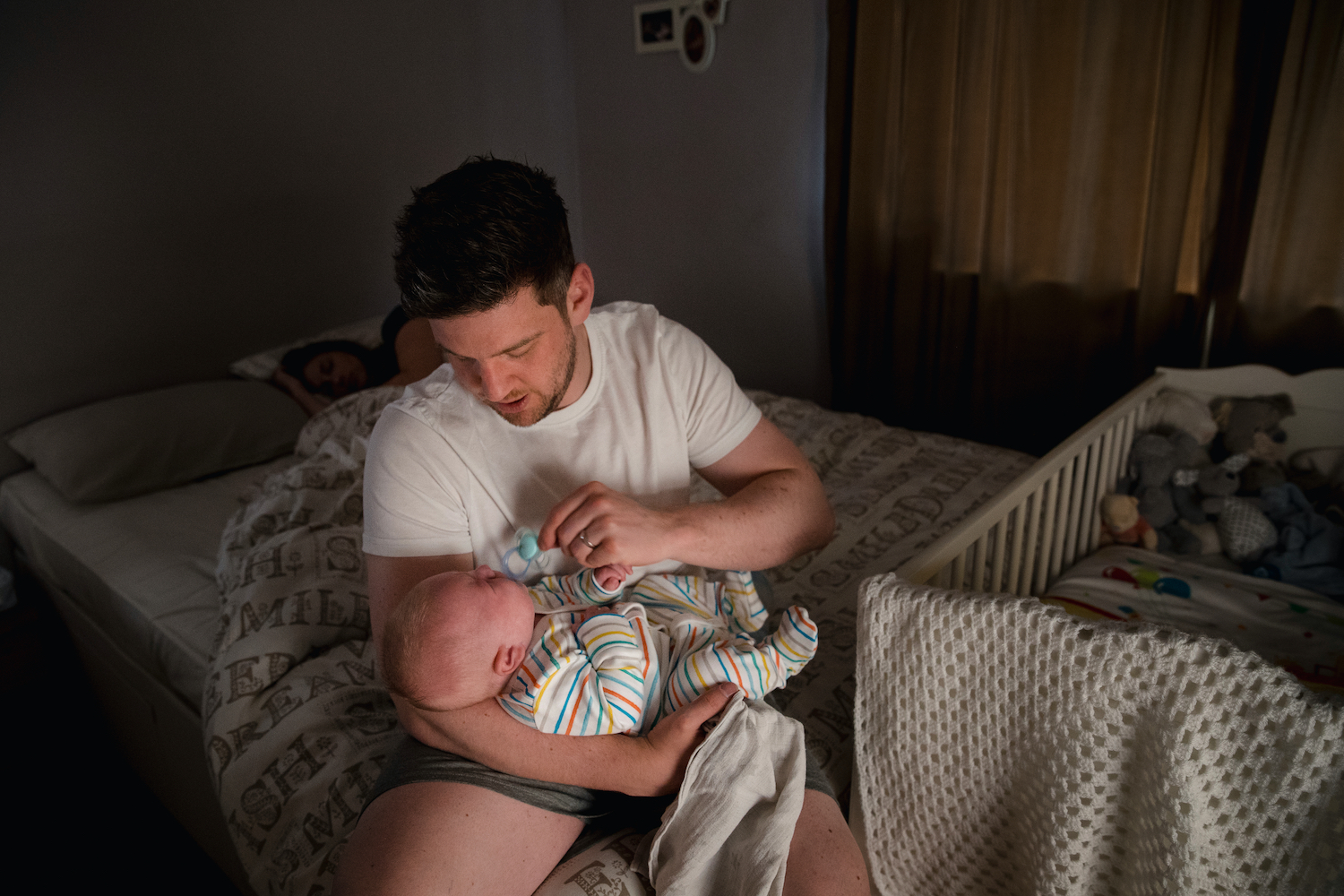 Gradually, if the mother does not work with overwork, the child enters the phase of superficial sleep and wakes up without going into deep sleep. Over time, the baby sleeps only superficially. And a dream of 20 minutes, no more, which is also gradually reduced. As a result, the child stops sleeping at night, often wakes up and sleeps only on the chest, during motion sickness or with a pacifier in his mouth.
Gradually, if the mother does not work with overwork, the child enters the phase of superficial sleep and wakes up without going into deep sleep. Over time, the baby sleeps only superficially. And a dream of 20 minutes, no more, which is also gradually reduced. As a result, the child stops sleeping at night, often wakes up and sleeps only on the chest, during motion sickness or with a pacifier in his mouth. - Teething. The baby has its first teeth. In the acute period in the first 2-3 days, when the pain is especially severe. In this case, there will be other symptoms - the baby will pull everything into his mouth, you will see increased salivation.
- External factors. After 3 months, sleep conditions greatly affect the baby's sleep, especially if the baby is sensitive.
6-12 months
- Mode problems. By 6 months, a predictable routine should already appear with 3 daytime sleeps, getting up at 7:00-7:30 in the morning and leaving at night until 20:00.
 But if the baby does not sleep well during the day and leaves late at night, then due to the accumulated overwork, he will not sleep well at night and wake up often.
But if the baby does not sleep well during the day and leaves late at night, then due to the accumulated overwork, he will not sleep well at night and wake up often. - Short. This factor less often affects nighttime awakenings. But it happens that a mother, afraid of overworking a child, puts her to bed too early. A tireless baby falls asleep for a long time and "walks" at night. It also happens if the child sleeps too much during the day.
- Inability to fall asleep independently.
At 6-12 months, most children, if they are not overworked and have no sleep associations, are able to fall asleep on their own. Mom's help, as in the first months of life, they no longer need.
But often the child has a habit of falling asleep during feeding, motion sickness, with a pacifier in his mouth, with his mother nearby. At night, waking up between sleep cycles, the child will ask for help too, to fall asleep. - Growth spurt period, mastering a new skill. This is not the main reason for frequent nighttime awakenings.
 Not a single developmental leap can seriously affect a child's sleep. Only for a few days. If you see that after mastering a new skill, the child stopped sleeping, it is worth checking other factors.
Not a single developmental leap can seriously affect a child's sleep. Only for a few days. If you see that after mastering a new skill, the child stopped sleeping, it is worth checking other factors. - Sleep conditions are now especially important for quality rest. The child actively explores the world around him, is easily distracted. Therefore, if the room is too light, it will be distracted by objects around. High or too low temperatures will make it difficult to fall asleep, as will too dry air, which makes it difficult to breathe.
- Physical discomfort. A child may wake up because of an overfilled diaper, uncomfortable sleepwear, or if he sleeps under the covers, keeps throwing it off and wakes up from the cold in the morning.
1-2 years
- One nap too early. At 10-12 months, children have a period when they refuse the second daytime sleep. Mom does not insist and transfers to one dream. But physically, the child's body is not yet ready for a long time of wakefulness.
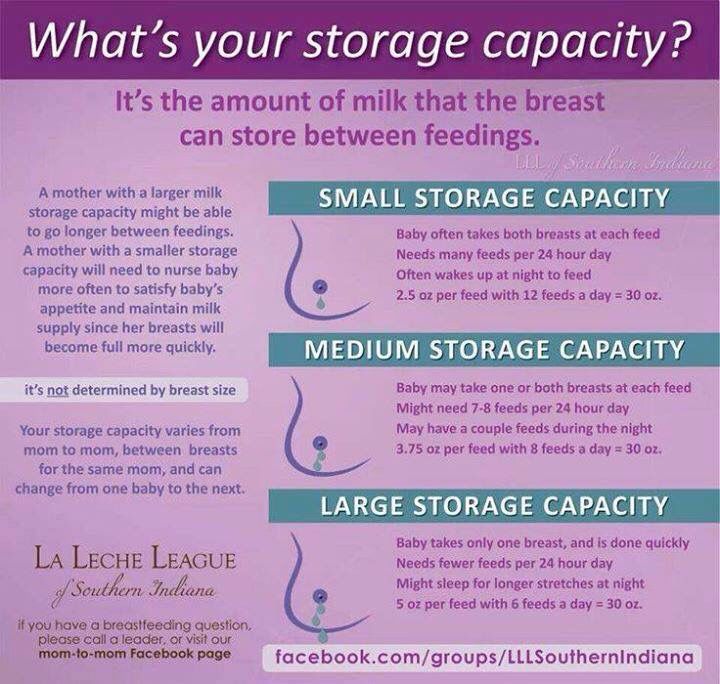 By evening, overwork accumulates, the child falls asleep for a long time and wakes up at night.
By evening, overwork accumulates, the child falls asleep for a long time and wakes up at night. - Daytime nap ends too late.
The child's brain regards sleep after 17:00 as nighttime. And if you decide to put the baby to the second daytime sleep late, for example, at 17:00-18:00 for an hour or two, he will wake up with tears and then go to bed very late at night. If your baby consistently naps after 4 pm, it's hard for him to sleep 12 hours straight at night. - Something or someone wakes up the child at night. After a year, if the child can fall asleep on his own, he can sleep in a separate room. Perhaps he reacts to extraneous noise and will sleep better alone in a room. It is worth transferring a child to another room only after consulting with a pediatrician.
- Teething, ear infection, digestive problems, stuffy nose cause frequent awakenings.
- Too early transfer to bed without sides. Until 2.5-3 years old, the child is not yet able to control his emotions in order to stay in bed without physical boundaries.
 If you are transferred to an "adult" crib too early, you may encounter nightly "festivities", trips of the child to the parents' room.
If you are transferred to an "adult" crib too early, you may encounter nightly "festivities", trips of the child to the parents' room.
2-4 years
- Overwork and nervous overexcitation. At this age, children begin to go to developmental classes and kindergarten. As a rule, there are problems with daytime sleep - the baby refuses to sleep or falls asleep too late during the day. New impressions, knowledge overexcite the child's nervous system and, with a lack of rest during the day, lead to a light sleep at night.
- Fears, separation anxiety, stress. These factors appear if the baby is going through a difficult period in life: the arrival of a second child in the family, potty training, a new nanny, or the start of kindergarten can cause separation anxiety during the day and restless sleep at night. Nightmares may also appear during this period.
- Inability to fall asleep independently. This is your case if after the end of the GW the child did not sleep better, or if he wakes up at night to drink compote, cannot fall asleep without you.

- Checking the boundaries of what is permitted. The child actively manifests his "I" and tests the boundaries of what is permitted. Often when it comes to sleep. Another fairy tale, another trip to the pot, the second yogurt. Bedtime is delayed, and at night there are awakenings to check if mom is nearby.
- Active development of speech. Like the previous skills that the baby has mastered, mastering speaking also affects sleep. The baby's brain is actively working and literally wakes him up to practice a new skill.
Why does the child not sleep at all at night and cries?
0-3 months
- The baby is going through the so called period " purple crying " . The apogee of crying falls on the 6-8th week of a child's life.
 Crying is sudden and unpredictable, like a baby crying in pain. Tears last for hours, especially in the evening and at night. As a result, the baby does not sleep at night.
Crying is sudden and unpredictable, like a baby crying in pain. Tears last for hours, especially in the evening and at night. As a result, the baby does not sleep at night. - Colic, allergy, dermatitis.
- Excessive fatigue.
4 months-2 years
- New skills. The child is actively trying to work out a new skill. During light sleep, the baby thinks about a new skill and starts trying it: crawling, getting up, etc. As a result, he wakes up. It `s naturally. If the baby does not know how to fall asleep on its own, you will need to put it down again.
- The child is cold or hot, he slept in an uncomfortable position.
The baby experiences physical discomfort (cold/hot, rested his arm/leg during sleep. He can eliminate it himself if he can move, or mom if the baby does not yet have motor skills. - Frequent awakenings at night among sleep and crying are a sign of accumulated overwork in the baby. The child may also shake his head and tremble.

- Asking for help if the child is unable to fall asleep on their own. Most often, the baby forms the association of feeding / rocking / nipple / mother next to sleep. His brain thinks that it is impossible to fall asleep in any other way, and indeed it is impossible. As a result, a tired child cries for help.
- Nightmares. Usually nightmares can be closer to 2 years. Until this age, the child does not know what he needs to be afraid of. All fears are formed in children under 2 years of age in response to the mother's reaction.
What should I do if my child has trouble sleeping at night?
What to do if your baby is not sleeping at any age:
- Make sure your baby is healthy. The pediatrician observing the baby will help you with this.
- Create suitable sleep conditions:
- The temperature should be no more than 18-21 degrees in winter and no more than 23-25 degrees in summer. Avoid overheating the child. Dress your baby according to the temperature in the room.

- Maintain optimum humidity of at least 50%.
- Darken the room for all dreams with curtains that block out sunlight. It is important that there is no gap between the curtains and the window, and electronic devices should not burn in the room. If the baby sleeps in the stroller, also use a special curtain on it or cover the stroller with a diaper.
- Spend 30-60 minutes before bed in quiet games. Finger games, puzzles, cutting, modeling, drawing are suitable here. Depending on the age of the child.
- Transfer active activities to the first half of the day - trips to the doctor, massage, developmental activities.
- Enter a sleep ritual that will help the baby tune in to sleep.
- Be consistent in your actions. It will take time for your baby and you to get used to a new sleep routine or habit. Keep this in mind and keep going.
0-3 months
Organize a place to sleep that your baby will later associate with rest. It can be:
- Adult co-sleeping bed.
- Crib, which is attached to the parent's bed with one wall lowered.
- Separate bed in parents' room.
In each case, the place to sleep must comply with safety regulations. Do not put the baby in the crib while awake to play. Also, it is necessary to put the child on his back, and not on his side or stomach. The American Association of Pediatricians recommends this position as the safest position for a baby to sleep.
Learn to recognize the signs of fatigue. This will help you prevent your baby from overworking. Common signs of fatigue in newborns:
- yawning;
- cam clenching;
- thumb sucking;
- distant look.
Start putting your baby to bed as soon as you see these signs.
Watch your wake time. Usually, in the first months, babies can be awake no more than the time of the previous sleep.
Usually, in the first months, babies can be awake no more than the time of the previous sleep.
Use different laying methods and alternate them. For example, for one dream you rock, for the second you feed, for the third you put the baby in the stroller for sleep. Do a short ritual before bed.
Teach your baby to distinguish between day and night. While awake, open the curtains, take the baby out into the light, do not muffle the noise. In the evening, turn off the overhead light, reduce activity. This will help set your baby's internal clock so he sleeps longer at night.
Use white noise and swaddle your baby so that he does not wake himself up with arms and legs during sleep and does not wake up from extraneous sounds.
3-6 months
Reduce fatigue. From 3 months, shift the bedtime to earlier, so that by 4 months the baby will fall asleep between 18:00-20:00. Also try to gradually get up in the morning no later than 7:30. Switching to a physiological regimen at 4 months will allow you to avoid frequent nighttime awakenings in the future.
Don't skip naps, but don't let your child sleep too much during the day either. For guidance, use the recommended sleep rates at each age.
When awakening at night, try to use a minimum of lighting, do not talk to the child if it is not necessary. So he will understand that he still needs to sleep, and he will fall asleep faster after feeding.
Reduce the number of nighttime feeds as your child gets older to avoid developing the habit of waking up to eat. By 6 months, babies are ready to eat every 4-5 hours and are able to sleep for longer periods of time.
Around 4-6 months old, we will notice that the baby is trying to fall asleep on its own. Help the baby: put him to bed not yet fully asleep. At night, at the first rustle, wait a minute or two and only then come up to calm the child. However, if the baby already has a habit of waking up and asking for help to fall asleep, this may not work.
If the baby sleeps only on the chest, you rock him day and night, awakenings are too frequent, then it is worth teaching the child the skill of falling asleep on his own. They teach the skill from 4 months.
They teach the skill from 4 months.
Not sure how to teach your baby to fall asleep on his own? Join an online CV course and your child will be sleeping through the night in less than a month. Find out the details on the website.
6-12 months
From this age, a fairly predictable 3-day nap routine should already be in place. Keep a regular daily routine so that your child's body knows when to sleep.
End your last nap before 5 pm and don't do it for more than 45 minutes on a three nap schedule. If the baby sleeps twice, both sleeps should be at least 1 hour each.
If your baby wakes up often in the morning for feeding and then does not fall asleep, try changing the feeding schedule. For example, if your baby falls asleep after feeding at 7:00 pm and wakes up to eat at 2 am, try waking him up at 11:00 pm. Then put the baby to sleep until feeding at 6 in the morning.
If there are too many feedings and the child wakes up not because of hunger, but out of habit, he cannot fall asleep on his own, it is worth teaching the baby the skill of falling asleep on his own using one of the methods.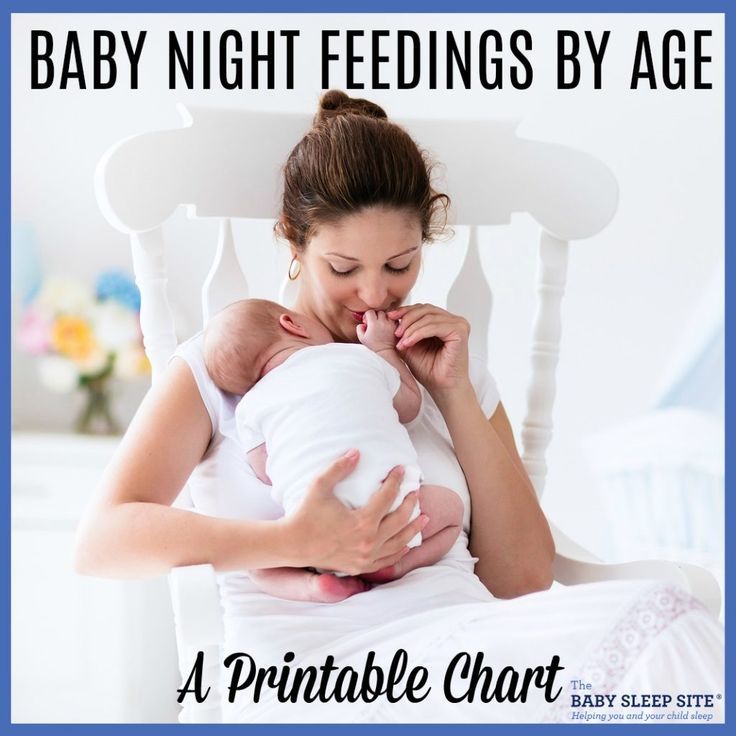
Baby wakes up and tries to crawl, get up in bed and roll over? Practice actively a new skill while you are awake so that your baby quickly masters the new capabilities of his body.
Offer your child a sleep toy. It will become a positive association. Choose a medium-sized toy, without small parts.
1-2 years
Don't overwork your child. The baby still needs early bedtime and two naps until 15-18 months. Do not wait for the baby to show when he wants to sleep. At this age, daytime dreams should already be done by the hour. For example, if you get up at 7:00, they will start at 9:30/10:00 and 13:30/14:00. Avoid staying awake for too long before going out into the night.
Avoid watching cartoons and playing games on your phone in the afternoon.
Do not transfer your baby to a crib without sides. If he started to wake up at night and tries to get out:
- lower the bottom of the bed as low as possible;
- build up the sides of the crib;
- change the mattress to a thinner one;
- use a sleeping bag that will limit your baby's movements.

2-4 years
Keep your daily bedtime routine.
Have an afternoon nap and finish it before 4:00 pm. Stick to early bedtime. Night sleep should begin no later than 20:30.
If your baby is afraid of the dark, try using a lamp with a dim, warm light. But not a projector with stars.
When you wake up at night, calmly get up and put him back down with minimal communication.
Explain to your child the rules for sleeping at night:
- everyone sleeps in their own beds
- don't play at night
- Read one book while going to bed, use the potty before going to bed
Basic rules for a good night's sleep
How to teach your baby to fall asleep in the evening without the help of parents?
- Enter the ritual for falling asleep.
- Make feeding, rocking, carrying on your hands part of the ritual, and not a way to fall asleep. To do this, use these actions in the middle.

- Put the baby to sleep in bed so that he realizes where he falls asleep and tries to fall asleep on his own.
- Gradually reduce sleep aid.
- Use the self-sleep technique.
How to teach a child to fall asleep after waking up at night?
1. Wait a few minutes before approaching the child and comforting. Let him try to sleep on his own.
2. When awakening at night, be as quiet as possible, do not use lights if possible.
3. If the baby does not fall asleep on his own, pat him on the tummy, chuckle, but do not take out their cribs.
4. If the child is used to falling asleep during motion sickness, reduce their amplitude so that he gradually gets used to falling asleep in a static position.
5. Does the baby fall asleep only during feeding? Feed and put the sleepy one in the crib, soothing with strokes.
Mistakes that parents make when arranging their child's sleep at night
- They wait until the baby wants to sleep and put him to bed too late.

- They let the baby play to the last and then abruptly begin to move on to bed.
- It is not always necessary to perform a ritual before going to bed.
- The last hour before sleep is spent with the baby in active games.
- Let your child watch cartoons before bed.
- They do not create suitable conditions for sleep and hope that the child will sleep in the light and noise.
When do you need specialist help if your child has trouble sleeping at night?
Seeking symptoms
The baby does not sleep at all at night and sleeps during the day.
The baby refuses to eat during the day, hangs on his chest all night.
Laying down at night lasts an hour and a half and is accompanied by tears, protests and tantrums.
The child wakes up too often for his age, cries on waking and wakes up cranky in the morning.
Your baby has symptoms such as hyperactivity, tremors in the limbs, slow growth and development, constant drowsiness, sleep apnea, snoring, nightmares.
The child stopped sleeping after 4 months and the old ways of lying down do not help.
You notice that the baby does not get off his hands during the day, has lost interest in games.
A child older than 4 months sleeps no more than 20-30 minutes during the day in one dream, you cannot prolong dreams.
How can a mother sleep if the baby does not sleep all night?
Research says that in the first year after giving birth, new parents lose 109 minutes of sleep each night on average. So, dad and mom in total do not sleep every night for 218 minutes. As if you were back in the institute time during the session. But unlike the previous days, you will not be able to sleep during the first lectures, as your newborn needs attention and care from the very morning.